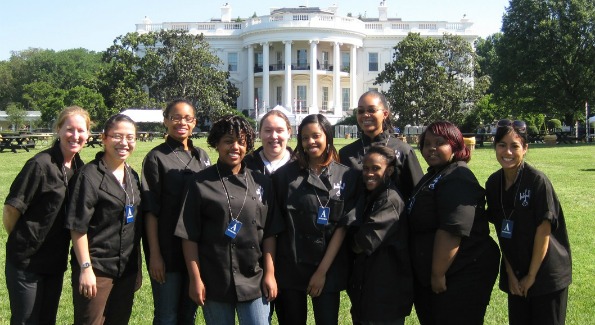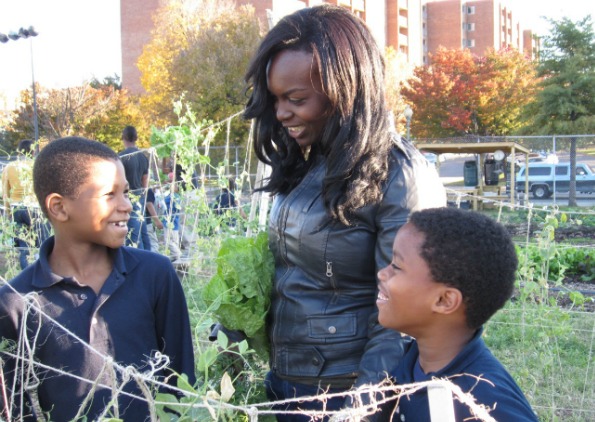Paul Dahm and his team use Brainfood as a tool for youth development.
By Kinne Chapin
In the Brainfood kitchen, 20 young adults are laughing and chatting as they pass each other measuring cups and ingredients. It’s a Tuesday afternoon, and the Brainfood Community MVPs are making a grapefruit cake. No one glances at the list of group expectations that adorns the fridge, but they are revealing nonetheless. Each year, Brainfood students create their own expectations for how they should behave in the kitchen, and the list includes everything from the expected, like “no cell phones,” to the refreshing, like “smile.”
This group of budding cuisiniers are Brainfood’s first MVPs, all graduates of the nonprofit’s year-long Kitchen All Stars Program for underserved high school students, in which they learned skills from baking to filleting fish, and were hungry for ways to stay involved in the organization. What did they want the second year of the program to entail? Paul Dahm, Executive Director of Brainfood, smiles visibly as he explains, “They told us, ‘We want to give back to the community and teach other people how to cook’…They’re teenagers and they feel like they can solve some of [the city’s] problems.”
So now Dahm and the Brainfood team are teaching the MVPs how to teach other people about food. They have been working on public speaking skills in order to sharpen the MVPs’ ability to present techniques in front of a crowd—including asking each MVP to deliver an elevator speech to Dahm…in an actual elevator.
The MVPs delivered their first presentation to second graders at Walker Jones Elementary School, using fresh food from the school’s garden. But Dahm hopes that the group will soon be working with older audiences, and even making their presentations to groups of adults. “If you’re a single parent, working two part time jobs, trying to keep a roof over your head, you’re just trying to feed your family and do it cheaply … the idea of changing your entire diet is intimidating and overwhelming,” Dahm explains. Having a high school student tell you simple ways to change your food habits make the switch seem entirely possible.
Brainfood is developing the MVP program while keeping their Kitchen All Stars program running at full speed. Since this is the eleventh year of the All Stars program, they have its pace down to a science. Dahm says they can predict everything from when participants will perfect their knife skills to when they will start advocating for healthy choice options like Veggie Chili and “lightened up” Chicken Alfredo. But each group of students still manages to surprise the experienced staff. “I’m always surprised at what they like and don’t like,” Dahm admits — like preferring a pasta puttanesca with capers and tuna to a plain tomato sauce alternative.
Back in the kitchen, the MVPs have gotten a different kind of surprise. They just learned that they received grant money to make a presentation about food and cooking to homeless teens — another idea that came straight from the MVPs themselves. Dahm refuses to let Brainfood have all the credit for cultivating the MVPs’ desire to help those less fortunate, however. “I don’t think these kids are unique,” Dahm insists. “I think that we don’t ask kids their opinion often enough.”
Quick Q&A with Paul Dahm
Washington Life: What is Brainfood’s mission?
Paul Dahm: Brainfood uses food and cooking as a tool to teach life skills to DC youth.
WL: How was Brainfood founded?
PD: It was started in 1999 by a woman named Susanna Isaac, who lived in Columbia Heights and saw that there was nowhere to go. She thought there needed to be safe places for young people to be…She literally started cooking in her apartment with kids. It grew from a handful of kids a year.
WL: What sets Brainfood apart from other Washington nonprofits?
PD: There are a lot of great youth development organizations in DC that are working towards similar outcomes, but I think the combination of using cooking to teach development is highly unusual, and I think that the fact that we’re so youth driven makes us unique. It’s the kitchen base, but especially the fact we allow them to have their own voice, and its such a strong voice.
WL: Finish this sentence: “I want people in DC to know that…”
PD: We’re not creating concrete learning paths for young people. There are a minority of young people who are going to go to college, and who fills the gap? I think that’s a gigantic, glaring, failing of leadership, that there are jobs in this city, and there are young people who want them, but there’s no one helping in the middle. How do we fill that gap? How do we find ways for skills to lead to opportunities? There are meaningful opportunities available, but they’re not available to the young people in this city.



